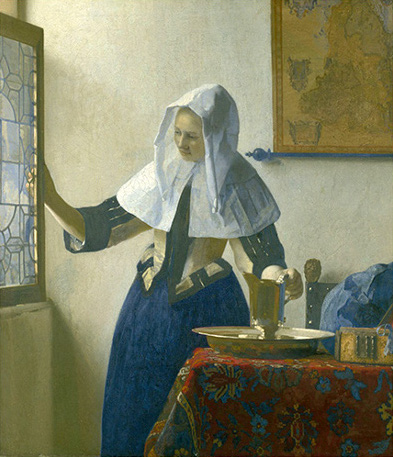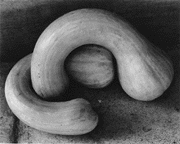The HyperTexts
Annie Finch

Annie Finch's books of poetry include Calendars (a
National Poetry Series finalist), Eve, Home-Birth, The Encyclopedia of
Scotland, Season Poems, Catching the Mermother, the epic
poem Marie Moving, and a book of translations of the French Renaissance poet Louise Labé. Her book on poetics, The Ghost of Meter,
has been reissued in paperback, and her anthology A Formal Feeling Comes: Poems in
Form by Contemporary Women is in its fifth printing. She is coeditor
of An Exaltation of Forms: Contemporary Poets Celebrate the Diversity of Their
Art, and her poems and translations have been published in
the Norton Anthology of World Poetry, the Penguin Book of the Sonnet, The Kenyon Review,
Poetry, Prairie Schooner, Field, The Paris Review, Agni Review, Thirteenth Moon, Partisan
Review, and elsewhere. She currently directs the Stonecoast Masters of Fine
Arts program in creative writing at the University of Southern Maine.

Still Life
A sunny afternoon, think of Vermeer.
Here is the apple, here the rounding side
of the blue pitcher. On the scrubbed wood just here,
she puts the pitcher down, so that the slide
of drops against its lip catches what light
there is for pitchers here this afternoon.
She does not really see the drops, or quite
attend the blue. A common thing. But soon
the tide will turn, and salty smells will rise
to circle in the street, and to her ears
will come the voices. Then doorways to her eyes,
then other days than this afternoon’s years.
She will stop to hold this moment near,
and drop the pitcher, and betray Vermeer.

Conversation
Poem on Edward Weston's "Squash" (commissioned for a centennial project of the Yale Art Gallery)
"Delve for me, delve down, delve past your body, crowned
by its hidden stem, into shadowy alarm;
you will not vanish past our dark-shed charm,
throat over throat, ankle to ankle, bound
in our different arches, summer-nicked and browned
interlocking rings in the chain of wrist and arm."
"Lie for me, lie, and I will feel you turn.
Mark out the summer's bending time. Yes, learn
to cradle the concrete ground to softness. Stay.
Measure me past my stem, though your shadows churn;
Close yourself over; encompass me like clay."
Copyright 2000 by Annie Finch
Brigid
Ring, ring, ring, ring! Hammers fall.
Your gold will all be beaten
over sudden flaming fire
moving from you, the pyre. Sweeten
your cauldron, until the sun
runs with one flame through the day
and the healing water will sing,
linger on tongues, burn away.
Previously published in SPELLS: NEW AND SELECTED POEMS
(Wesleyan University Press, 2013)
The Woman On The Beach
for Wallace Stevens
She could cliff and order waves, if they could climb
over to feed on her touch, or listen near
in a frieze of drowning fingers. But it's time
to open herself to drowning now, to hear
phantoms come tooling over shale in roars,
rooting with waverings and singing air
out of her hands until she plants and pours,
learning the music. It makes no difference where
her seeds go out, her harvests in. A rack
of dark waters nears her questioning, till caves
curl under her noticing shore. They double back
noticeless, stilling her undertow in waves.
Spiralled with dreams, nourished and bound and woman,
she gathers to green, listening, shaman and human.
Published in Wallace Stevens Journal and Calendars, Tupelo Press, 2003
Landing Under Water, I See Roots
All the things we hide in water
hoping we won't see them go—
(forests growing under water
press against the ones we know)—
and they might have gone on growing
and they might now breathe above
everything I speak of sowing
(everything I try to love).
Published in Partisan Review and Calendars, Tupelo Press, 2003
Meeting the Cave
Here no ledge can slice footholds,
no new mineral drip,
no soundbeam sink or angle,
no change of quiet drop
out through the circling ceiling
where acid water spilled
to hollow out its chamber
into this cold dry well.
With my dark eyes open,
I search into the dark
for a reassurance
to soothe me like a look—
a reassuring darkness
only dark will reassure,
a night to my humanness
the unparticled will pour,
the inhospitable, solid,
unbreakable deep kiss,
the womb to throw me outward
to a circumference,
the dark that will not need me
to see its ancient light,
its opposite, neglecting
behind the night's heart light,
when my feet will leave the cave
to birth dark at a crawl
through hundreds of limestone miles
and feed the cracks of the world.
Published in Wallace Stevens Journal and Calendars, Tupelo Press, 2003
Coy Mistress
From Eve, in answer to the poem by Andrew Marvell
Sir, I am not a bird of prey:
a Lady does not seize the day.
I trust that brief Time will unfold
our youth, before he makes us old.
How could we two write lines of rhyme
were we not fond of numbered Time
and grateful to the vast and sweet
trials his days will make us meet?
The Grave's not just the body's curse;
no skeleton can pen a verse!
So while this numbered World we see,
let's sweeten Time with poetry,
and Time, in turn, may sweeten Love
and give us time our love to prove.
You've praised my eyes, forehead, breast:
you've all our lives to praise the rest.
Copyright 1978 by Annie Finch
Sonnet 10 by Louise Labé (1520-1566)
When I see your blond head in its laurel crown
and hear your melancholy lutestrings sing
with a sound that would seduce almost anything,
even rocks or trees; when I hear of your renown,
all the ten thousand ornaments that surround
your virtue, endowing you more than a king
so the highest praise grows dim with your sparkling—
then my heart cries, in a secret passion of her own.
Since all your graces are well-loved and known,
since everyone's esteem for you has grown
so strong—shouldn't these graces help you start
to love? To all the virtues that make you great
adding knowledge of my own pitiable state,
so that my love can softly enflame your heart?
Sonnet 16 by Louise Labé (1520-1566)
After a time in which thunder and hail
have beaten the mountains—the Caucasian height—
a fine day comes, and they're clothed again in light.
When Phebus has covered the land with his circling trail,
he dives to the ocean again, and his sister, pale
with her pointed crown, moves back into our sight.
When the Parthian warrior has spent some time in the fight,
he loosens his bow and turns from his travail.
When I saw you plaintive once, I consoled you, though
that provoked my fire, which was burning slow.
But now that you have given me your embrace
and I am just at the point where you wanted me,
you have quenched your own flame in some watery place;
now it's colder than my own could ever be.
Cleopatra by Anna Akhmatova
“I am air and fire. . .”
— Shakespeare
“Alexandria's palaces
Were covered with sweet shade.”
—Pushkin
Already, she's kissed her cold Antony on his dead lips.
Already, she's kneeled down in front of Augustus and cried.
And now she's betrayed by the servants: victorious trumpets
sound under the Eagle of Rome, and the darkness spreads wide.
The last of her beauty's tall conquests comes in, his voice grave;
his stammering whisper enfolds her as he bends to say,
“They'll lead you past him in the Triumph—you, like a slave. . .”
Her throat, like the neck of a swan, holds its tranquil sway.
Tomorrow, the children in chains. And so little remaining
for her in the world; just to banter again with this man,
then take the black snake in a gesture like pity, and bring
it close to her rich breast at last, with a casual hand.
Translated with George Kline; from Spells;
originally published in Diner and Drunken Boat
The HyperTexts


